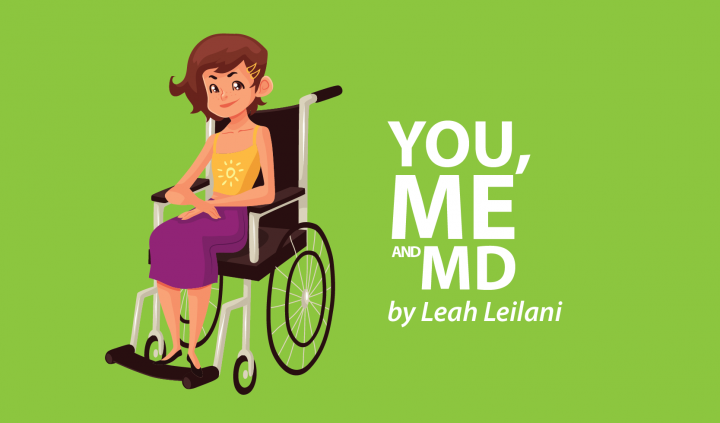I’ve Learned How to Deal with Judgment About My Disease
Written by |

In this day and age, when we have so much awareness about diversity, it surprises me how judgmental people can still be.
It was rare 60 years ago to see someone with a disability out and about, much less living a relatively typical lifestyle with a job and spouse. It’s 2019, but it can feel as though people remain stuck in the old ways of thinking. The perception of someone confined indoors, friendless and unlovable, is inaccurate and out-of-date. Those of us with disabilities and chronic illnesses are capable of many things, though we may not do them in an orthodox manner.
At the age of 7, I began showing signs of weakness and fatigue. Seemingly out of nowhere, my mom started pestering me with questions. She’d ask how I was feeling and if I was OK. As a little kid, I had no knowledge of how rapidly my body was deteriorating.
My life then was full of physical activities and adventures like going to Disneyland and spending hours at the beach with my family. Before I knew it, though, I had little energy to attend school and to do homework.
Throughout that difficult time, my friendships never wavered. I’ve been very fortunate to be part of a small group of loyal and dear companions. Even in the early days when dealing with school officials who accused me of faking my illness, I was comforted that my two best friends weren’t bothered that I needed a wheelchair.
The Muscular Atrophy News forums are a place to connect with other patients, share tips and talk about the latest research. Check them out today!
It seems to me that children are generally much more accepting of differences in others than adults are. Maybe it’s due to the lack of conditioning by society or because they’re fascinated by the cool new toy I’m driving around in. Perhaps we expect adults to be mature and we’re shocked when they display rude or ignorant behavior.
I’ve heard horror stories from others who’ve experienced harsh judgment about their disease. I recently read a story in The Mighty about a young woman who decorated her wheelchair for the holidays. She shared examples of the criticism she received when she first started using a mobility aid. In one incident, while exiting a store using her walker, a man stopped her and called the police claiming that she had stolen the walker from an elderly person. She had to explain to the officer that she had a medical need for her equipment.
I had one of my worst experiences of judgment during my third-grade year. At the time, my wheelchair mainly helped me travel long distances. Walking for long periods of time was gradually becoming more difficult. Officials at the school didn’t understand my worsening muscle weakness. One day, the principal shut down the closest wheelchair-accessible bathroom. Because of this, I was forced to wheel to another restroom that wasn’t wheelchair accessible, using much of my valuable energy in the process. She did this despite my family providing several letters from my physicians explaining my condition.
Part of my personality is looking on the bright side of things, but I won’t lie and say that moments like these don’t cloud the sunshine. These situations tend to anger me more than sadden me, though, because they are unjust and unnecessary. Life is so much easier without creating drama.
These experiences have taught me many things. One is that drama damages a person’s mental health. Such strong emotions of anger and frustration toward a situation in which one has no control waste a lot of energy. The only way to be free from such turmoil is to let it go. Accept that it happened, that it was wrong, and that you are loved and valued by many others.
These instances say a lot about the people creating them and have nothing to do with the individual with the disability. We are merely a casualty in a war that rages inside of them.
Have you ever experienced this type of situation? If so, please share in the comments below.
***
Note: Muscular Dystrophy News is strictly a news and information website about the disease. It does not provide medical advice, diagnosis or treatment. This content is not intended to be a substitute for professional medical advice, diagnosis, or treatment. Always seek the advice of your physician or another qualified health provider with any questions you may have regarding a medical condition. Never disregard professional medical advice or delay in seeking it because of something you have read on this website. The opinions expressed in this column are not those of Muscular Dystrophy News or its parent company, Bionews Services, and are intended to spark discussion about issues pertaining to muscular dystrophy.







Debra
Thanks for your article. I also have been diagnosed with FSHD muscular dystrophy and have experienced much drama because of others judgements. Yes, children are more accepting than adults because as children we are more on equal ground maybe?? Jesus said of children that "of such are the kingdom of heaven". Yes, it hurts, and I empathize with you. I especially like your last line... "These instances say a lot about the people creating them and have nothing to do with the individual with the disability."
Leah Leilani
I’m so glad to hear that you enjoyed reading my article. It means a lot to me to know that people can relate to my content and find comfort in it. I’m sorry you’ve had to experience similar situations but I hope my article inspired you to remain strong and keep you head help high.